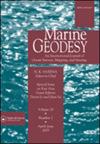案例研究:满足港口基础设施监测特定需求的海上移动激光雷达系统的严格轴视对准
IF 1.4
4区 地球科学
Q2 GEOCHEMISTRY & GEOPHYSICS
引用次数: 0
摘要
对港口基础设施进行准确的监测是港务局的一项重要工作。为了在这种高度动态的环境中正常运行,我们探索了安装在船上的尖端移动激光雷达系统(MLS)的潜力。为了生成高质量的3d点云,以满足监测任务所需的预期精度,激光雷达扫描仪和定位和定向系统(POS)必须进行角度对齐,也称为轴视对齐。在本研究中,我们介绍了一种适用于港口基础设施监测的基于预制平面目标的瞄准方法。在对平面目标模拟数据进行分析的基础上,提出了一种准直点设计方案。然后,我们在一个真实的场景中应用这个轴向对齐站点设计。所得结果可准确估计横摇角和偏航角误差,标准差小于0.002度,俯仰角误差标准差小于0.015度。最后,我们定义了一个验证点,并描述了使用这些特征来验证估计参数质量的过程。轴视对准前后的地理参考点云的相对比较表明,轴视系统误差对最终点云的影响有所缓解。本文章由计算机程序翻译,如有差异,请以英文原文为准。
Case Study: Rigorous Boresight Alignment of a Marine Mobile LiDAR System Addressing the Specific Demands of Port Infrastructure Monitoring
Abstract Accurate infrastructure monitoring of ports and harbors is a vital operation conducted by the port’s authority. To operate regularly in this highly dynamic environment, we explore the potential of the cutting-edge mobile LiDAR systems (MLS) mounted on a vessel. To generate a high-quality 3 D point cloud that would satisfy the expected accuracy required in the monitoring task, the LiDAR scanner and the positioning and orientation system (POS) must be angularly aligned also known as boresight alignment. In this research, we introduce a boresight alignment methodology adapted to the port infrastructure surveillance based on prefabricated planar targets. After an analysis of planar target simulated data, we propose a boresight alignment site design. Then, we apply this boresight alignment site design in a real-world scenario. Obtained results estimate accurately roll and yaw angles errors with standard deviations of less than 0.002 degrees and pitch angle error with standard deviation less than 0.015 degrees. Finally, we defined a validation site and described the procedure that uses these features to validate the quality of the estimated parameters. The relative comparison of the georeferenced point clouds, before and after boresight alignment demonstrates the mitigation of the boresight systematic error impact on the final point cloud.
求助全文
通过发布文献求助,成功后即可免费获取论文全文。
去求助
来源期刊

Marine Geodesy
地学-地球化学与地球物理
CiteScore
4.10
自引率
6.20%
发文量
27
审稿时长
>12 weeks
期刊介绍:
The aim of Marine Geodesy is to stimulate progress in ocean surveys, mapping, and remote sensing by promoting problem-oriented research in the marine and coastal environment.
The journal will consider articles on the following topics:
topography and mapping;
satellite altimetry;
bathymetry;
positioning;
precise navigation;
boundary demarcation and determination;
tsunamis;
plate/tectonics;
geoid determination;
hydrographic and oceanographic observations;
acoustics and space instrumentation;
ground truth;
system calibration and validation;
geographic information systems.
 求助内容:
求助内容: 应助结果提醒方式:
应助结果提醒方式:


